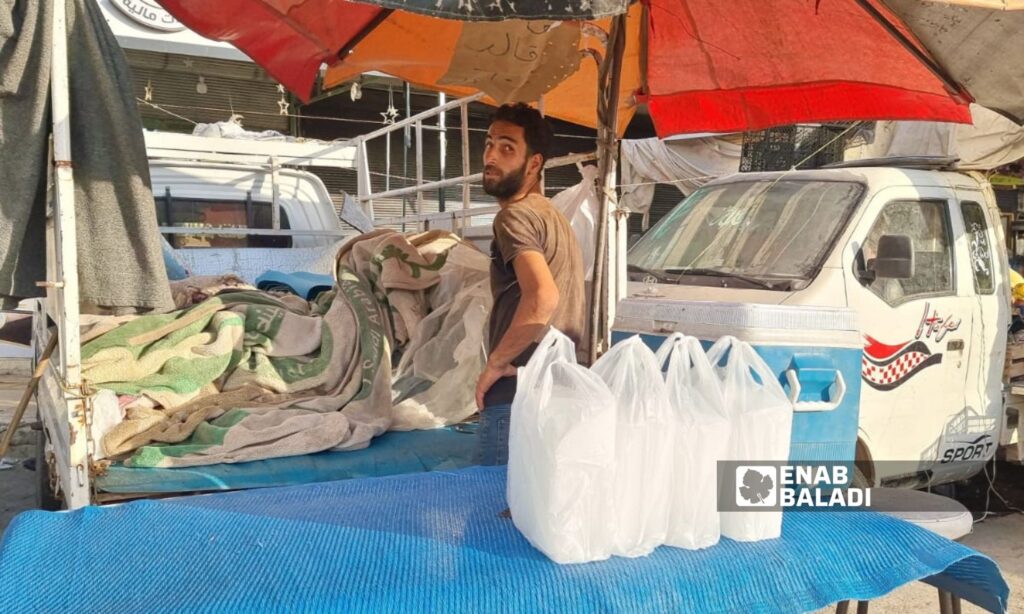Idlib – Anas al-Khouli
The demand for ice blocks in the city of Idlib, northwest Syria, has surged, causing prices to reach unprecedented levels, particularly with the rising temperatures.
Previously, the price for an ice block was around 25 Turkish lira. With the heat and the arrival of Eid al-Adha between June 16 and 19, the price increased to 35 Turkish lira from the factory, with an additional markup of 5 to 10 lira by street vendors, due to the difficulty in securing the product.
Ahmad al-Bahri, a young man from Idlib, searched for hours in hopes of finding a vendor selling ice blocks but was unsuccessful. He added that he does not own a refrigerator and relies on buying ice daily.
According to Enab Baladi’s correspondent in Idlib, demand has increased despite the rising prices. When a truck with ice blocks arrives, its contents are sold out within an hour.
Low production
A typical ice factory produces 220 blocks every 12 hours, capable of producing two batches a day. With the rising temperatures, the factory now needs 18 hours to produce a single batch.
Yasser Mirri, an ice vendor, had to travel to the city of Hazzano, about 25 kilometers from Idlib, to obtain ice because of its shortage in the city.
Mirri reported to Enab Baladi that demand has increased by 100% in recent days, while factory production has decreased by 35%, leading to a crisis in the area. Vendors are now having to stay overnight at the ice factories to await production.
According to Mirri, an ice block costs 25 lira from the factory. Vendors cut the block into four pieces, selling each piece for 10 Turkish lira.
With the increasing demand, the price of a block has risen to 35 lira. Vendors now cut the block into five pieces, selling each for 10 lira, leading to a price increase and a reduction in piece size.
Camp inhabitants suffer the most
Residents of the displacement camps in the area suffer more in securing ice blocks, compounded by the conditions of the tents that do not protect against the heat, being made of fabric and plastic. Each family needs at least two pieces of ice daily, costing an amount that many families cannot afford.
Northwest Syria is home to 5.1 million people, 4.2 million of whom need assistance, with 3.4 million suffering from food insecurity. Of these, 3.4 million are internally displaced persons, and 2 million live in camps, according to the United Nations. Local statistics estimate the population to be between 5.5 and 6 million.
A worker’s daily wage in the best circumstances reaches 100 Turkish lira (approximately three US dollars).
There are initiatives by local and international organizations, as well as the Syrian Salvation Government (SSG), to provide cold water and ice blocks. Distribution varies between ice pieces or cold water bottles, depending on the residents’ refrigerators’ capacity.
Many residents have sent distress calls through Enab Baladi to all humanitarian organizations, urging them to improve living conditions in the camps and alleviate their suffering from severe heatwaves. They called for measures to prevent damage and accidents that might occur during upcoming heatwaves.
Engineer Anas al-Rahmoun, who lives in Idlib province, stated that June 20 marks the last day of spring, with summer officially beginning the following day. He added that summer this year will last 93 days, 17 hours, and 56 minutes.
Al-Rahmoun also mentioned that June 20 is the longest day of the year in Syria, with 14 hours and 36 minutes of daylight, and the shortest night, lasting 9 hours and 24 minutes.

